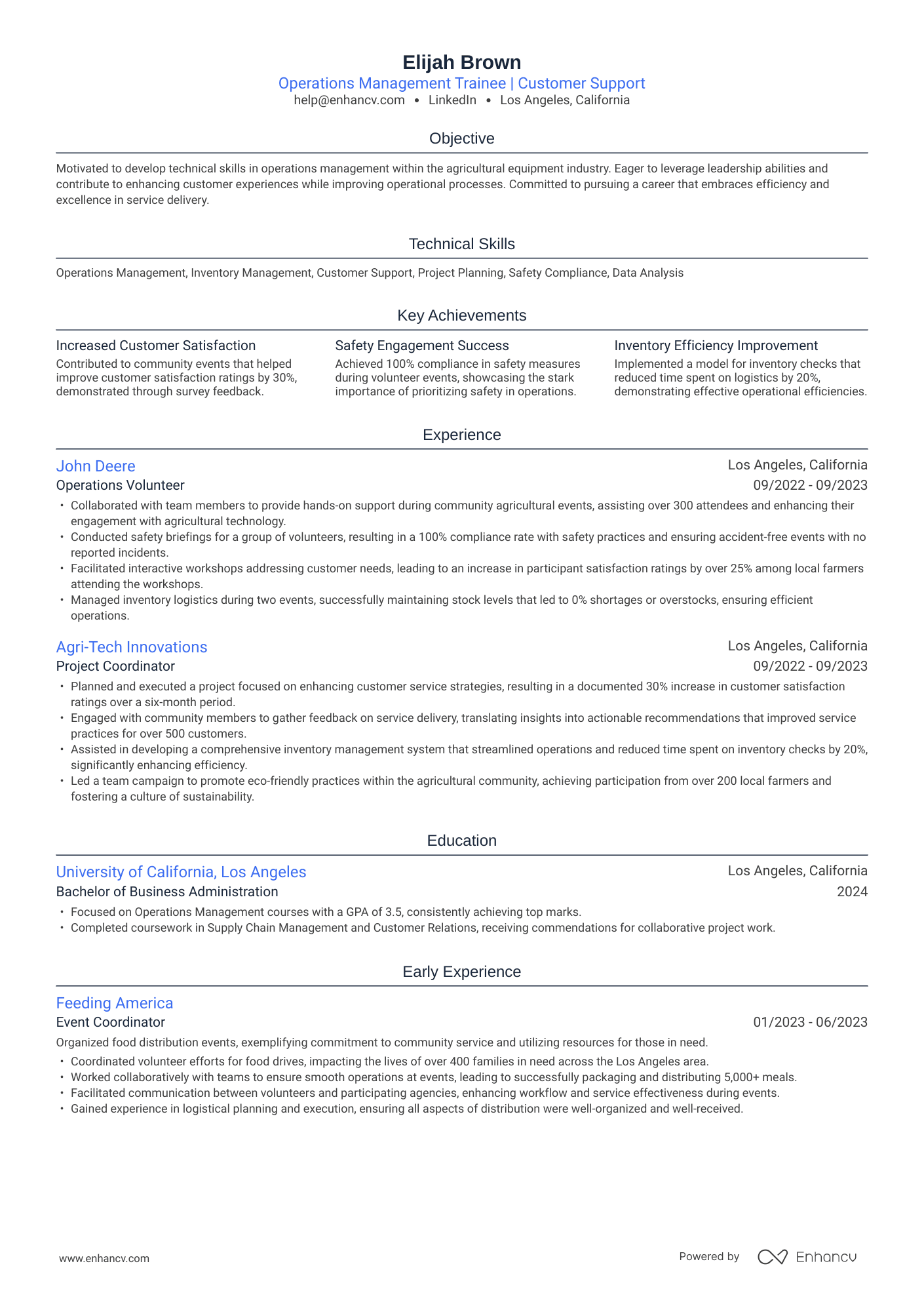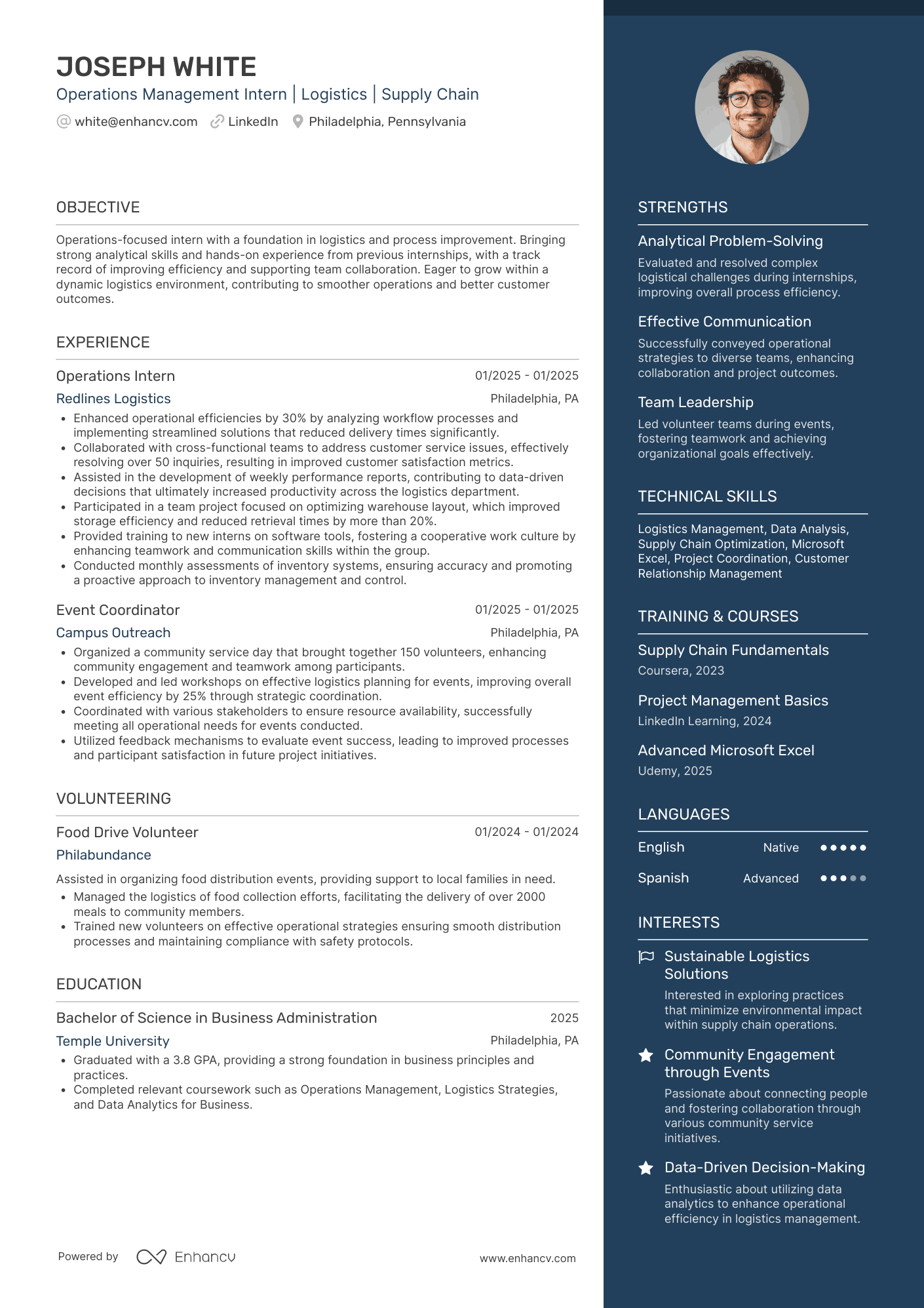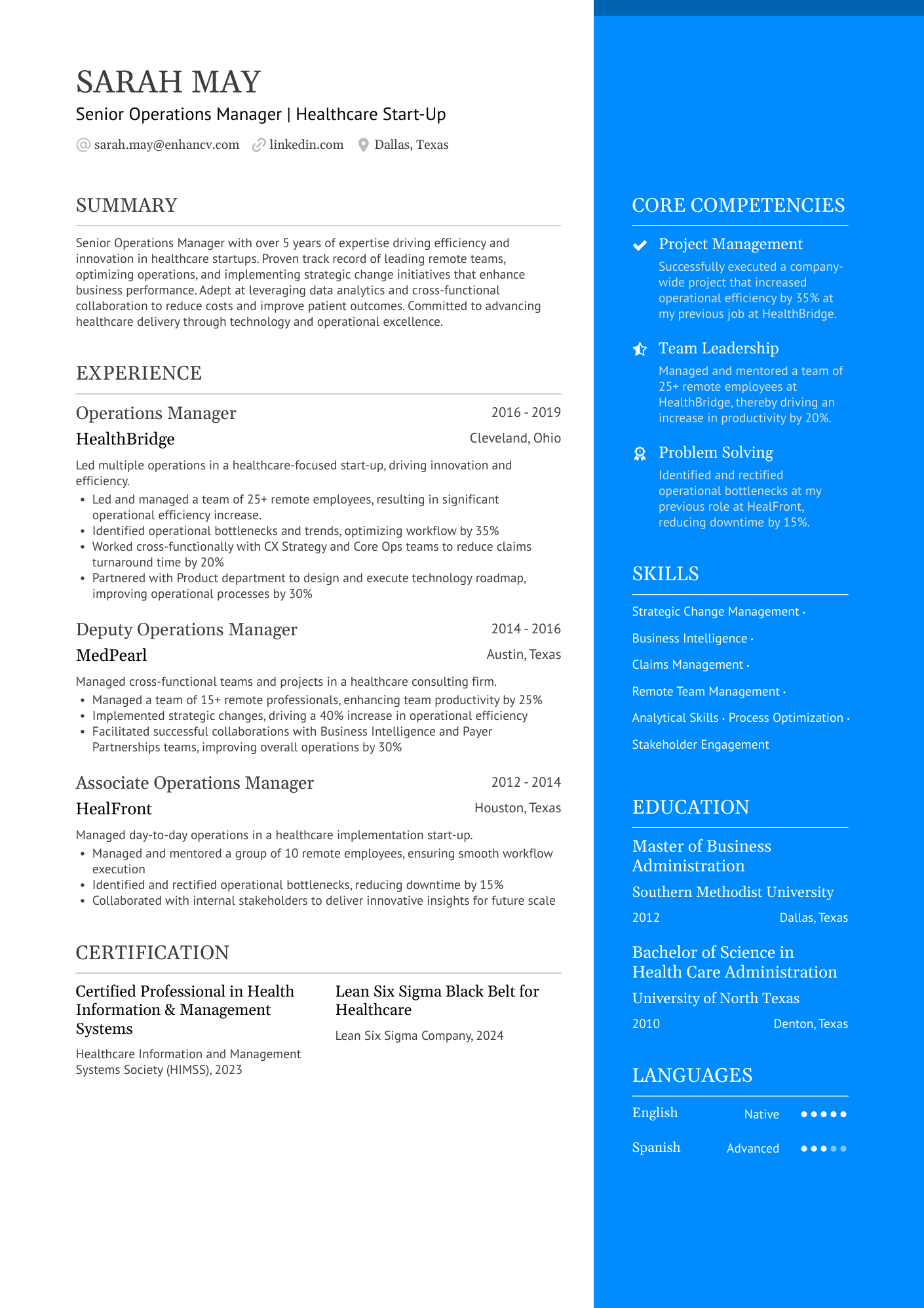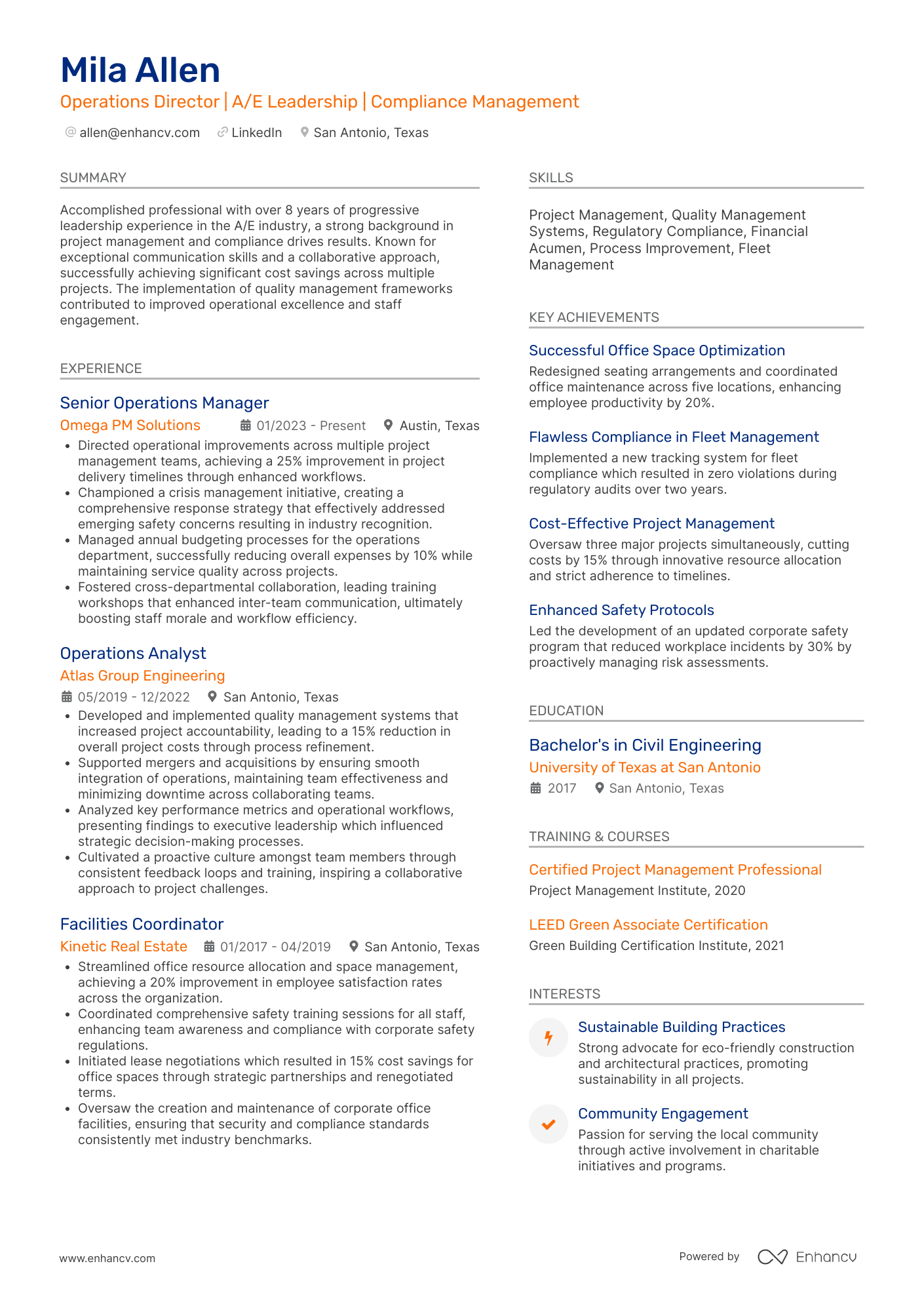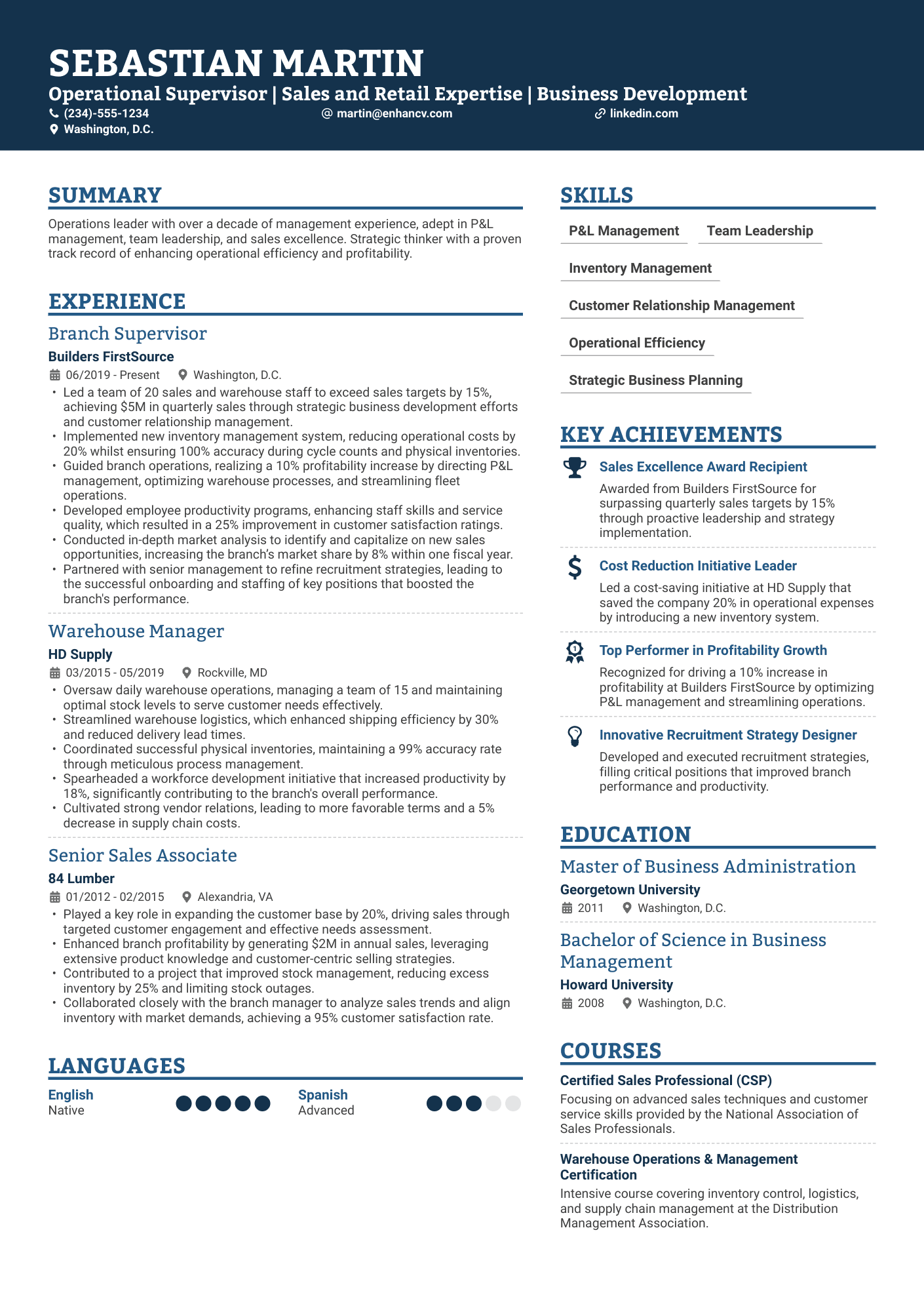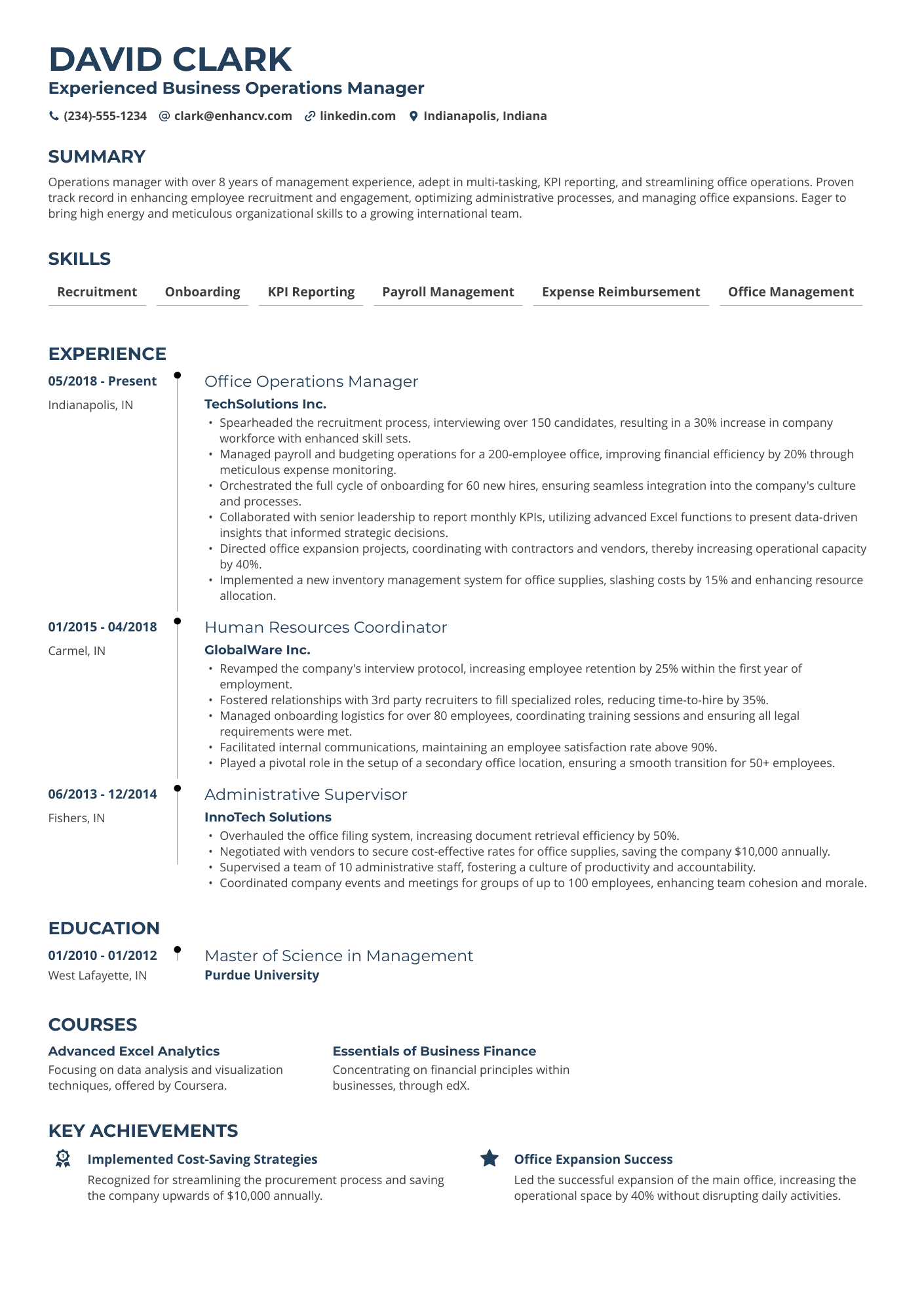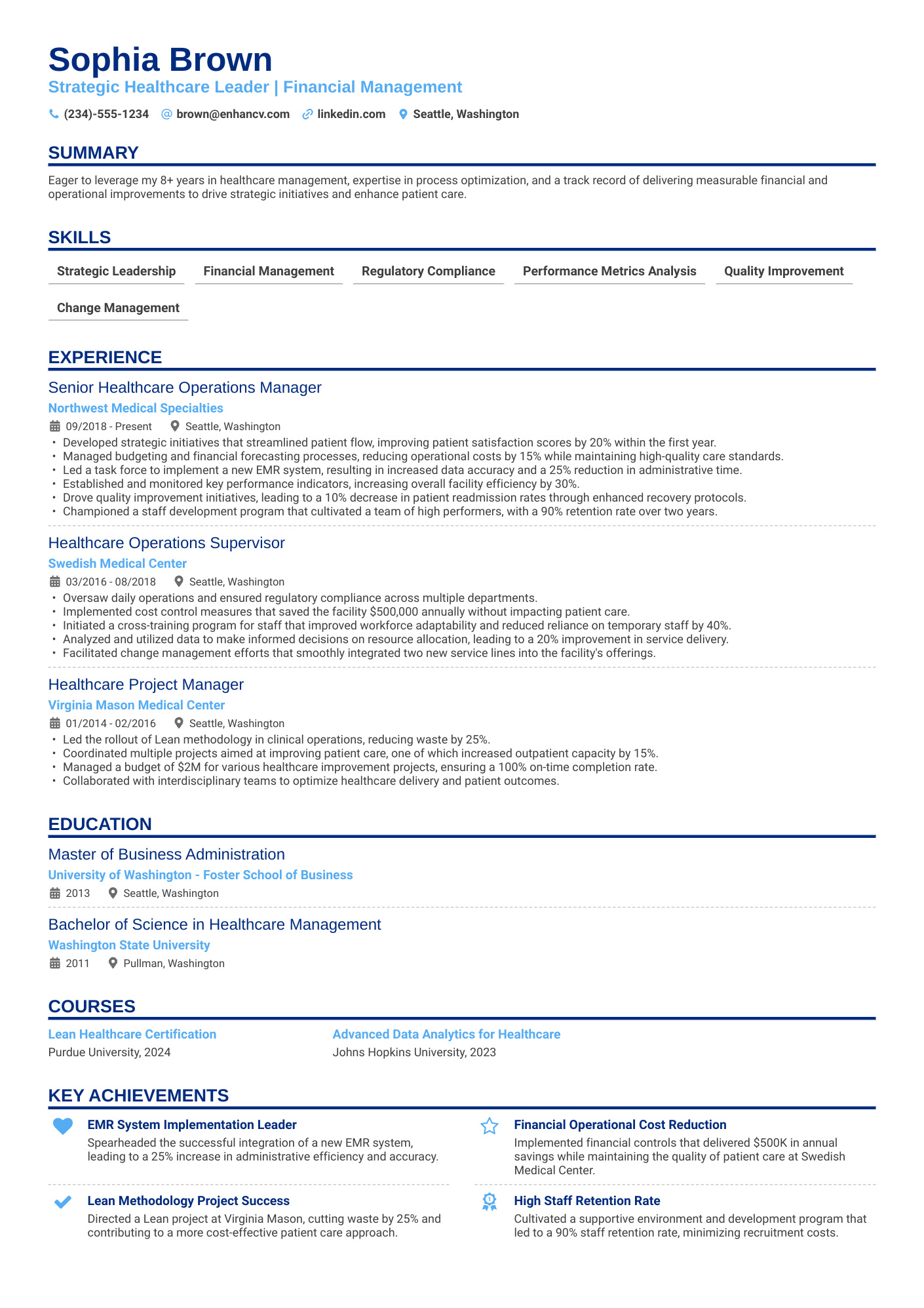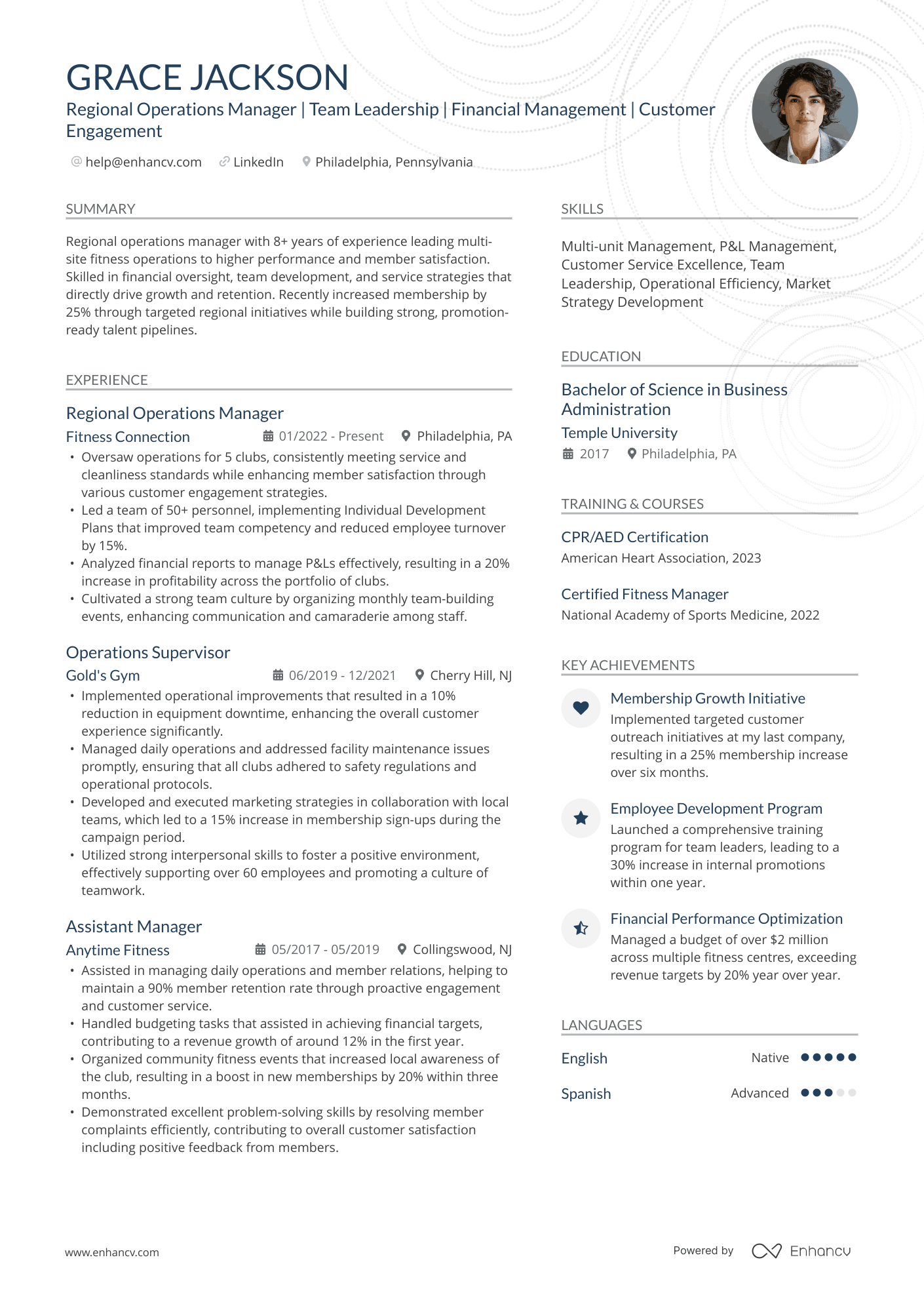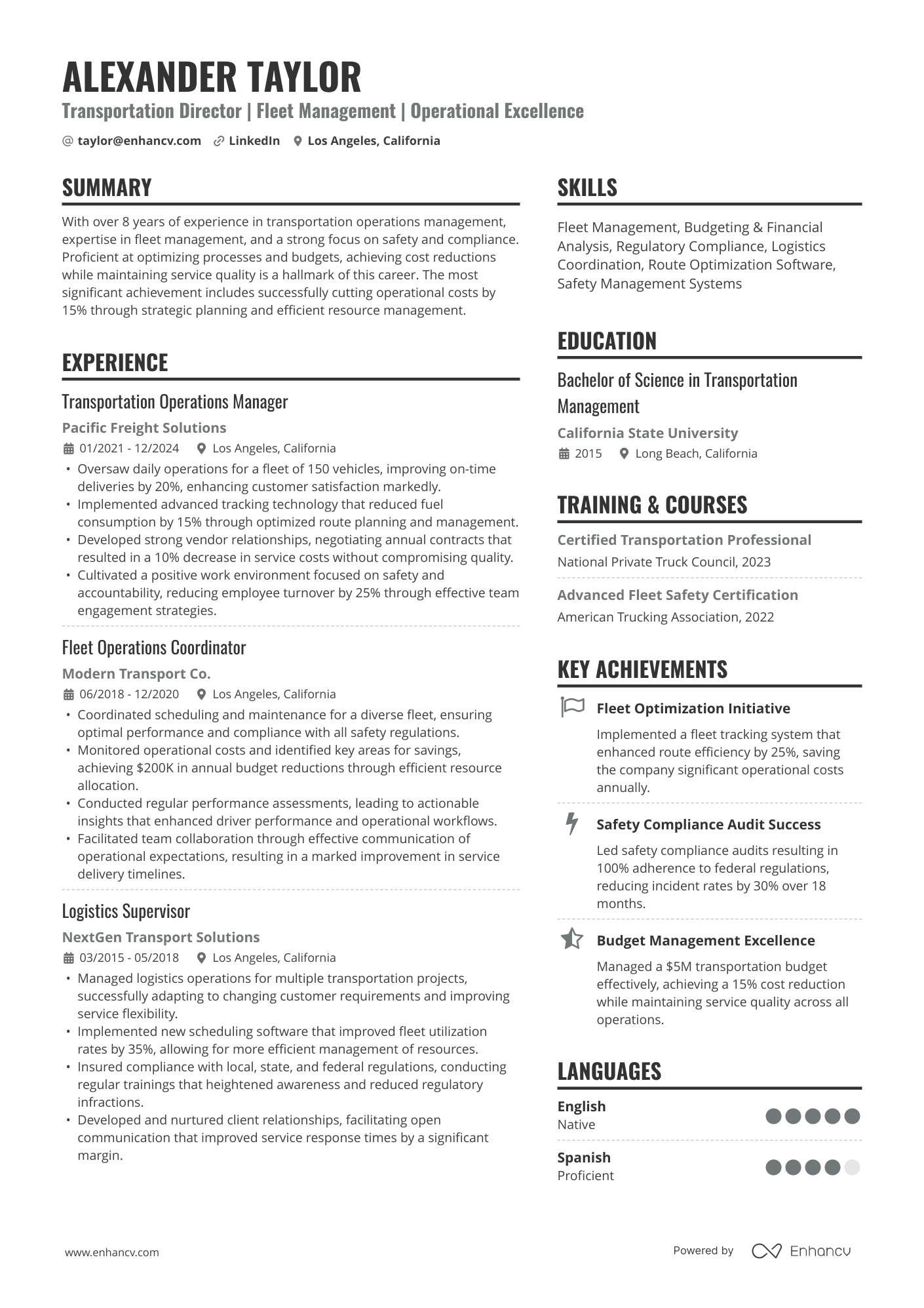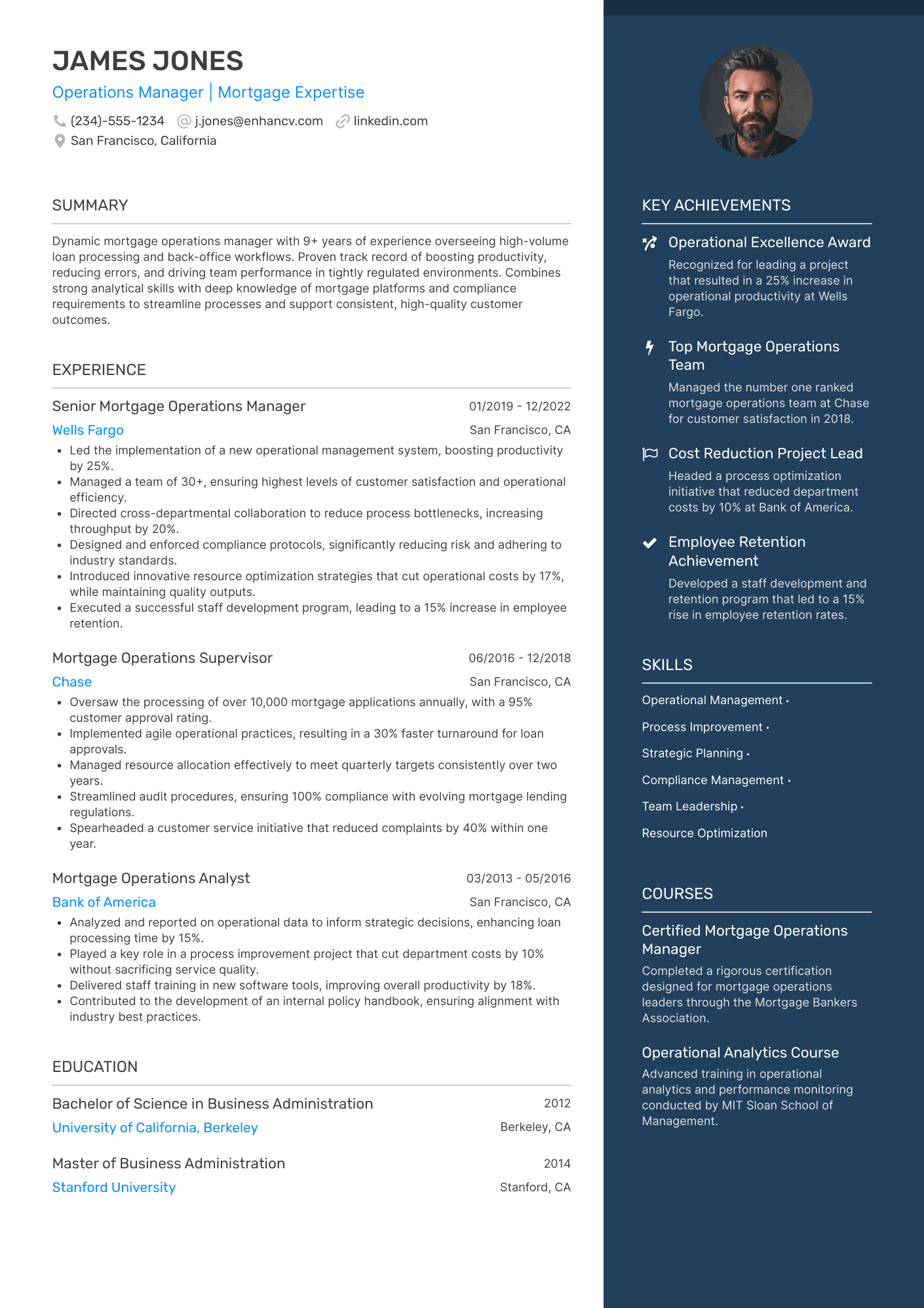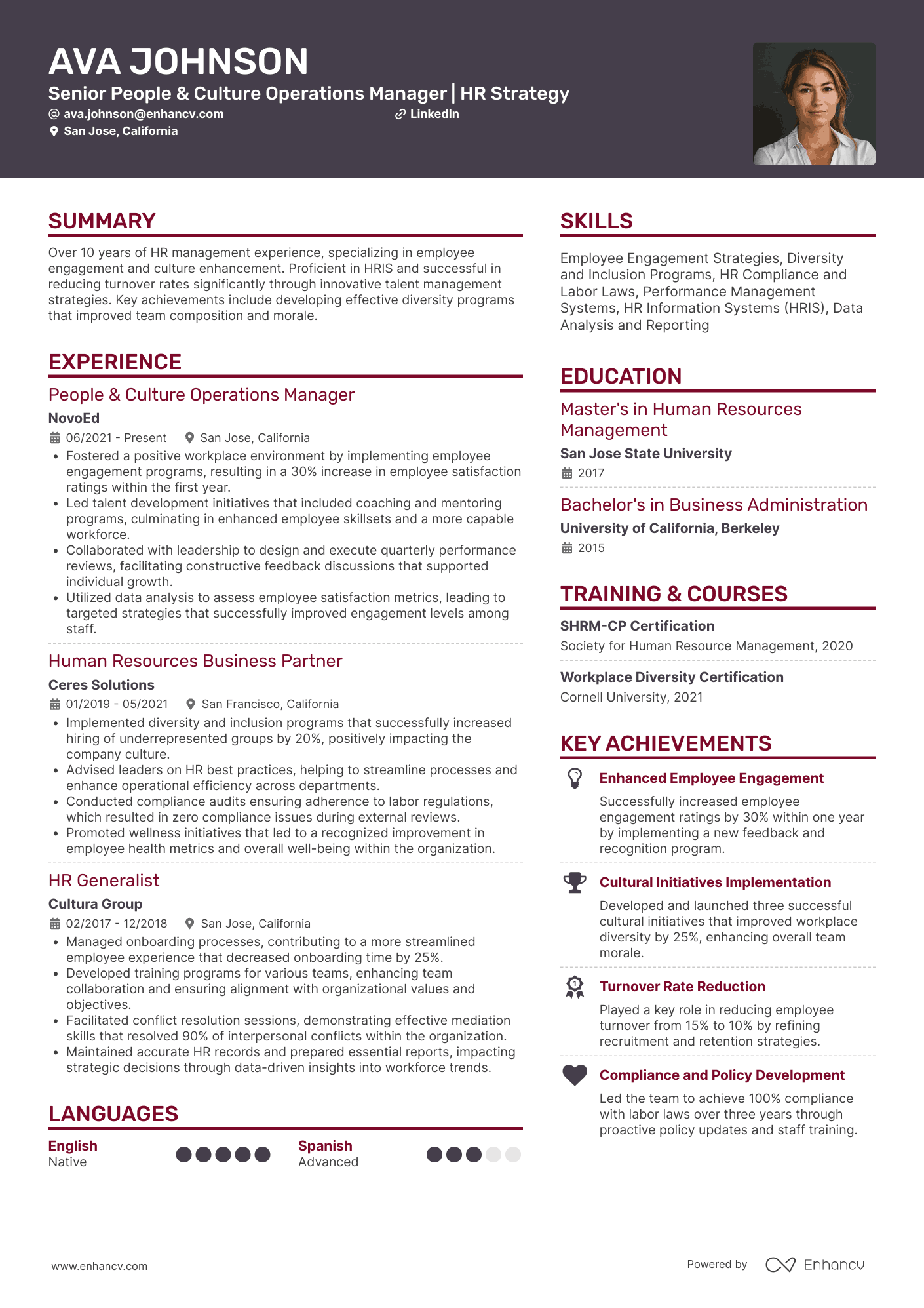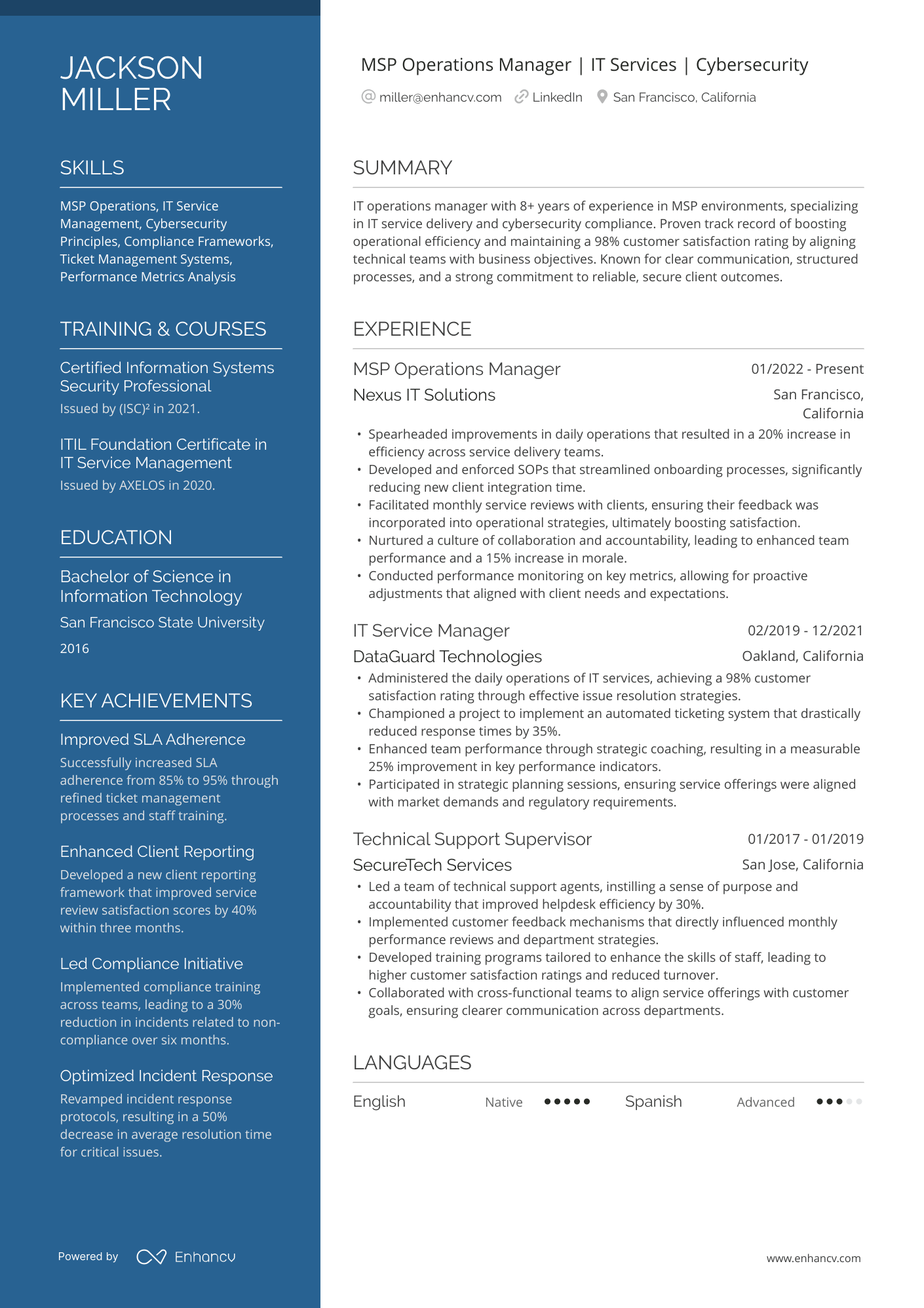With disrupted supply chains and shifting demand, companies must do more with less—making the operations manager’s role more critical than ever. As recent business analysis shows, employers aren’t just looking for steady hands. They want leaders who can drive process improvement, make strategic decisions under pressure, and keep teams moving in the right direction.
Whether you’re changing sectors or aiming for a senior role, your resume must show how you deliver operational clarity and impact the bottom line.
This guide will help you build an operations manager resume that shows your impact clearly and confidently. Want to make the process easier? Enhancv’s AI Resume Builder gives you structure, prompts, and polish so your operational strengths are clear to hiring managers.
Key takeaways
- Show your ability to adapt quickly to changing business needs and work confidently with modern tools and technology.
- Back your achievements with clear metrics—efficiency gains, cost reductions, accuracy improvements, or productivity increases.
- Tailor your resume to the job description by using relevant keywords and prioritizing experience that matches the company’s priorities.
- Highlight how you work across teams and departments to support strategic initiatives and remove operational bottlenecks.
- Use Enhancv’s AI-powered resume tools to structure your content, improve clarity, and present your operational strengths more effectively.
If you want to learn by example, the resumes below show how operations managers across different sectors present their strengths.
24 Operations manager resume examples you can copy or adapt
By Experience
By Role
For those who prefer to build their resume from scratch, we provide all the necessary details in the sections below.
How to format an operations manager resume
For operations managers, the best resume format is typically the reverse-chronological. It puts your most recent role and results at the top, which helps hiring managers judge your impact and leadership readiness.
It also works cleanly with applicant tracking systems (ATS) and gives you plenty of room to highlight metrics and team outcomes without overcomplicating the structure.
If you’re changing industries or have a less linear work history, a hybrid (combination) resume can also work well. It lets you lead with key competencies before moving into your experience section. This helps you spotlight relevant strengths even when your past titles don’t perfectly match the role you’re targeting.
What sections should go on an operations manager's resume?
When creating your reverse-chronological resume, keep your sections in a clear, familiar order so hiring managers can scan them quickly:
- Header
- Summary
- Professional Experience
- Education & Certifications
- Skills & Area of Expertise
- Key Achievements
Once you’ve laid out the basics, run your resume through Enhancv’s resume-checking tool to see how well it performs with applicant tracking systems.
Is your resume good enough?
Drop your resume here or choose a file. PDF & DOCX only. Max 2MB file size.
Now that the structure is in place, let’s focus on the section that carries the most weight: your work experience.
How to write your operations manager resume experience
Perfecting your experience section matters most because this is where you prove the impact of your decisions, not just your responsibilities..
Focus on the overlap between your background and the company’s priorities, then build each bullet with strong, active verbs and a clear result.
Using the STAR approach (Situation, Task, Action, Result) helps you frame achievements so it’s clear how you improved processes, solved bottlenecks, or strengthened performance. This is the kind of detail hiring managers look for when assessing operational leadership.
To see what this looks like in practice, here’s an example of a senior business operations manager in manufacturing:
Good example of an operations manager’s experience section
Senior Business Operations Manager
Norwest Precision Manufacturing | Chicago, IL
2019–Present
- Led end-to-end plant operations across machining, assembly, and distribution, improving on-time delivery from 87% to 98% within 12 months through targeted workflow redesign.
- Drove a 22% reduction in production costs by introducing lean manufacturing practices, renegotiating supplier contracts, and consolidating underutilized equipment.
- Spearheaded a cross-functional initiative to standardize SOPs across three facilities, cutting process variation by 30% and strengthening audit readiness.
- Managed a team of 45+ across operations, planning, and quality, implementing a coaching framework that reduced turnover by 18% year over year.
- Partnered with engineering to roll out a new predictive maintenance program, reducing unplanned downtime by 42% and extending asset life cycles.
To create equally strong entries, tailor your experience to the job description and focus your achievements on the outcomes the company cares about most.
How to tailor your operations manager experience
Aligning your resume with the job at hand makes your application immediately more relevant. It shows you understand what the company needs and positions your experience as the answer.
Here are a few quick ways to tailor your experience section:
- Pull out the key skills and priorities from the job description and reflect them in your bullet points.
- Use metrics that mirror what the company tracks—whether that’s throughput, cost savings, or quality improvements.
- Match your language to the employer’s terms (e.g., “continuous improvement,” “line efficiency,” “SOP compliance”).
- Prioritize achievements that solve the same problems the role is responsible for.
The table below uses a real operations manager job description to show how a generic bullet compares to a tailored, role-ready version.
Resume tailoring examples for operations managers
| Job description excerpt | Untailored bullet | Tailored bullet |
|---|---|---|
| Develop and implement efficient warehouse procedures | Responsible for creating and improving warehouse procedures. | Redesigned warehouse procedures to streamline receiving and put-away workflows, cutting processing time by 28% and reducing errors during peak volumes. |
| Train and develop the warehouse team. | Trained warehouse staff and helped support team performance. | Built a structured coaching programme for 30+ warehouse associates, boosting pick accuracy from 93% to 99% and reducing onboarding time by 40%. |
| Maintain ideal inventory levels and accurate record-keeping | Handled inventory levels and kept records up to date. | Introduced weekly cycle counts and a real-time tracking system that increased inventory accuracy to 98% and reduced stockouts by 35%. |
Tailoring your resume to a specific role is one of the most effective ways to get a recruiter’s attention—something U.S. hiring managers repeatedly confirmed in our latest study.
Adding language that reflects the job’s main tools, processes, and industry terminology helps your resume feel instantly relevant.
With Enhancv’s Job Tailoring feature, you can shortcut the process. It analyses the job description and shows you exactly how to align your experience with the requirements employers care about most. Plus, you don’t have to manually build a keyword list yourself!
Another strategy worth using is backing up your claims with real evidence and context. The section below shows you how to do that effectively.
How to quantify your achievements on a resume
Just like how metrics and KPIs gauge business performance, numbers on your resume spotlight your impact. For operations managers, it's all about making your achievements clear and easy to grasp.
Here’s what you can focus on:
- Mention percentage reductions in costs, such as cutting operational expenses by 15% through process improvements.
- Quantify increases in efficiency, like boosting production line output by 20% after implementing new systems.
- Specify the financial impact of projects, such as saving the company $500,000 annually through improved supply chain management.
- Include data on time savings, for example, reducing order processing time by 30% with streamlined workflows.
- Highlight any growth in key performance indicators (KPIs), such as a 10% increase in customer satisfaction scores due to better service delivery.
You can weave these examples throughout your resume—especially in your experience and summary sections. Just keep in mind: if your claims aren’t quantified, recruiters have no way to verify the impact behind them.
PRO TIP
Enhancv’s Bullet Point Generator can help you shape stronger, clearer bullets. It nudges you toward the types of operational results hiring managers look for, so you can focus on tailoring the details to your own experience.
Operations manager skills on a resume
Operations managers should highlight both the expertise they already use day-to-day and the skills they’re actively developing. Staying current matters—the role increasingly relies on modern systems and technology-enabled processes.
To make this clear to employers, include a dedicated Skills or Tools & Technologies section. Prioritize the competencies that match the job description’s keywords so recruiters can immediately see you’re aligned with what the role requires.
Here are some core hard skills found on operations manager resumes—use those that match your target role:
Best hard skills for your operations manager resume
- Enterprise Resource Planning (ERP) systems
- Lean Six Sigma methodologies
- Customer Relationship Management (CRM) software
- Supply Chain Management (SCM) software
- Data analysis tools (e.g., Tableau, Power BI)
- Inventory management systems
- Artificial intelligence
- Project management software (e.g., Asana, Trello, Microsoft Project)
- Manufacturing Resource Planning (MRP) systems
- Automation software
- Workforce management systems
- Business Intelligence (BI) tools
- Warehouse management systems
- Quality management systems (QMS)
- Predictive analytics software
- Logistics management software
- Financial planning and analysis (FP&A) tools
- Vendor management systems
- Time tracking software
- Procurement software
- Performance management systems
As operations become more digital, employers expect managers to feel comfortable with modern platforms—not just spreadsheets and email. You don’t need to know every tool on this list, but highlighting the ones you actually use can show you’re ready for technology-enabled operations.
Tools operations managers increasingly work with
- Robotic Process Automation (RPA) tools (e.g., UiPath, Blue Prism)
- Internet of Things (IoT) monitoring systems for equipment, fleets, or facilities
- Predictive maintenance and analytics platforms
- Automated workflow and process management systems
- Cloud-based ERP and supply chain platforms
- Advanced warehouse management systems (with barcode/RFID scanning and automation)
- Business intelligence and dashboard tools
- Workforce management and digital scheduling tools
- Digital quality and compliance platforms (e.g., eQMS, audit and CAPA tools)
When listing skills, give them context wherever you can. For example, many Enhancv users prefer placing tools and technologies directly in their experience entries. This signals how those skills contributed to real results rather than sitting as isolated buzzwords.
Example:
“Partnered with QA to standardize deviation reporting through TrackWise, increasing audit readiness scores from 82% to 96%.”
The same principle applies to soft skills. They carry more weight when backed by evidence. Instead of simply listing “time management,” show it in action with a short line in your strengths or achievements section, such as: “Coordinated operations across three departments, supporting a 17% rise in quarterly production targets.”
Here are some common people skills expected from operations managers:
Top soft skills for your operations manager resume
- Leadership
- Communication
- Problem-solving
- Time management
- Team collaboration
- Decision-making
- Adaptability
- Strategic thinking
- Conflict resolution
- Attention to detail
- Critical thinking
- Negotiation
- Organizational skills
- Customer focus
- Project management
- Stress management
- Multitasking
- Process improvement
- Emotional intelligence
- Delegation
Another way to strengthen your resume is to spotlight education and certifications that support your operations manager profile. These credentials show you have the formal training, industry knowledge, and continuous development mindset needed to lead complex operational environments.
How to list your education and certifications on your resume
Operations management is a field where having the right educational foundation definitely helps. Most employers expect at least a bachelor’s degree in business, operations management, supply chain, or a related area, and many professionals build on that with advanced training.
Your education section should include:
- Degree and major (e.g., B.A. in Business Administration)
- University name and graduation year
- Optional: relevant coursework or projects
- Academic honours or your GPA if higher than 3.5
Here’s a structure you can adapt for your own resume:
Good example of an operations manager’s education section
Bachelor of Science in Industrial Engineering
Purdue University | West Lafayette, IN
2010
- Coursework in Manufacturing Processes and Systems, Lean Manufacturing Principles
- GPA: 3.6.
That said, education isn’t the main deciding factor in an operations manager’s resume. Once you meet the basic degree requirement, employers focus far more on your results—how you’ve improved processes, led teams, and solved operational problems.
Where you can really stand out is through certifications. Lean, Six Sigma, project management, or supply chain credentials show you’re current with industry tools and committed to continuous improvement.
Below are some specific examples of operations management credentials that can boost your resume’s impact:
Best certifications for an operations manager resume
With your certifications validating your key skills, let's focus on crafting an impressive resume summary that sets you apart as an operations manager.
How to write your operations manager resume summary
The summary section provides a quick overview of your skills and achievements.
Check out the essential elements for an effective resume summary:
- Start with your professional title and years of experience in operations management.
- Highlight key skills and accomplishments and support them with concrete examples.
- Mention your familiarity with relevant technologies and methodologies, like ERP systems or Lean Six Sigma.
- Keep it concise with three to five strong sentences, using powerful adjectives to describe your accomplishments.
- Skip the personal pronoun “I” and start directly with the verb in the present or past tense.
Here’s an example of an assistant operations manager summary that shows clear impact in a high-volume warehouse environment
Operations manager—professional summary example
Resourceful assistant operations manager with 3+ years of experience supporting daily warehouse and logistics operations in high-volume environments. Improved order processing efficiency by 18% through tighter workflow coordination and better use of data tools. Known for strengthening inventory controls, resolving bottlenecks quickly, and helping teams hit performance targets ahead of schedule.
This summaryincludes quantifiable achievements, like an 18% increase in processing efficiency, so recruiters can easily see the candidate's value and impact.
With the core sections in good shape, it’s worth looking at a scenario many job seekers face: applying for an operations manager role without direct experience.
How to write a resume for operations management without experience
It’s more common than you might think. Мany operations managers move into the field from logistics, admin, customer service, or analyst roles.
If you’re aiming for your first OM position, here’s how to make your resume work harder for you:
- Use a resume objective to explain your move: A short objective can frame your motivation and show you’re intentionally pursuing operations, not applying at random to any opening.
Resume objective for operations managers—example
Operations professional-in-training transitioning from office administration and customer service with a track record of improving workflows, coordinating cross-functional projects, and solving day-to-day problems—eager to apply these strengths in an entry-level operations management role.
- Reframe your past roles through an operational lens: Highlight times you improved a workflow, coordinated people, or solved day-to-day problems. Those are core OM skills.
- Use a skills-forward or hybrid layout: Place your most relevant competencies (organization, scheduling, stakeholder coordination, data tools) at the top. This de-emphasizes the lack of prior experience.
- Quantify everything you can: You don’t need the formal title to show operational value. Efficiency gains, error reduction, throughput improvements, or customer response times all count.
- Include relevant internal initiatives or side projects: Even owning a shift handover process or helping pilot a new scheduling tool shows operational thinking.
- Consider a professional template or AI guidance: Enhancv’s layouts and AI Builder can help shape your story, structure your strengths, and ensure your content feels focused rather than entry-level.
We encourage people to go to meetings, hand out their resume, and start to build a network among the operations management profession. The best way to break into the profession is to build a professional network. A lot of the time, this can and does lead to a job interview.
Eric Schaudt, Manager of Operations Programs, Material Planning, and Analysis at Northrop Grumman
Looking for help drafting your first operations manager resume? Here’s a sample you can adapt to your needs, whether you’re using Enhancv or building it in MS Word or Google Docs.
Operations manager resume sample
James Tyler
Manufacturing Operations Manager
tyler@enhancv.com @LinkedIn Foley, AL
Summary
CPIM-certified professional with over 8 years in manufacturing operations, specializing in driving process improvements, team leadership, and customer satisfaction. Proven track record in managing production requirements, developing high-performing teams, and fostering strong cross-functional collaborations. Adept at influencing business objectives and implementing continuous improvement methodologies.
Experience
Manager, Manufacturing Operations
Boeing, Seattle, WA
January 2015 — Present
- Managed daily operations, ensuring production goals were met and addressing any deviations with corrective actions.
- Served as a key liaison between the company and external customers, representing the organization internally and externally.
- Led and developed a high-performing team, providing coaching and professional development opportunities.
- Collaborated with business development, strategy, and engineering teams to identify and secure new business opportunities.
- Implemented lean manufacturing and continuous improvement practices, enhancing operational efficiency and cost-effectiveness.
- Ensured adherence to customer quality, delivery, and cost requirements.
- Optimized material processes, scheduling, and inventory management.
Operations Supervisor
General Electric Aviation, Cincinnati, OH
June 2010 - December 2014
- Supervised a team of 30 in the production of aerospace components, ensuring compliance with industry standards and company policies.
- Developed and implemented process improvements that reduced waste and increased efficiency by 15%.
- Coordinated with quality assurance teams to address and resolve production issues.
Education
Bachelor of Science in Industrial Engineering
Purdue University, West Lafayette, IN
Graduated: May 2010
- Coursework in Manufacturing Processes and Systems & Lean Manufacturing Principles
Certifications
- Lean Six Sigma Green Belt (ASQ — American Society for Quality)
- Certified Manufacturing Engineer (CMfgE) (SME — Society of Manufacturing Engineers)
Skills
- Manufacturing Operations Management
- Lean Manufacturing and Continuous Improvement (CORE, QCPC)
- Team Leadership and Development
- Customer Relationship Management
- Strategic Planning and Business Development
- Inventory Management and Optimization
- Microsoft Office Suite (PowerPoint, Excel)
Languages
- German (Fluent)
- Spanish (Conversational)
Frequently asked questions about operations managers’ resumes
If you’re wrapping up your resume and still have a few questions, these quick answers should help.
What does an operations manager do (and what are the 7 functions of operations management)?
In simple terms, operations managers make sure the day-to-day work of a business runs smoothly, efficiently, and in line with its goals. Different sources define the “7 functions” slightly differently, but most versions include areas like:
- Planning & forecasting: deciding what needs to be done, when, and with what resources.
- Process & workflow design: shaping how work actually gets done, step by step.
- Capacity & resource management: matching people, equipment, and time to demand.
- Supply chain & inventory management: getting the right materials to the right place at the right time.
- Quality & risk management: keeping standards high and operations compliant.
- People & performance management: leading teams, allocating tasks, and coaching for better results.
- Continuous improvement: using data and feedback to refine processes over time.
On your resume, you don’t need to list these as theory. Instead, show them through your achievements and direct experience. That way, you cover the core functions and stay focused on what matters to hiring managers.
How should I format my operations management resume?
Start with a clear header that includes your contact details and a straightforward headline.
From there, format your resume with clarity and structure in mind:
- Use standard margins (0.5-1") to keep your resume neat and readable.
- Consider a double-column layout to present your managerial skills and notable achievements.
- Opt for traditional fonts in sizes 10-12 pt and use subtle color accents to maintain a professional look.
- Strive to keep your resume toone page, to demonstrate your efficiency and ability to communicate key information succinctly. However, if you have more than 10 years of experience, a 2-page document works great, too.
- Name your resume file clearly, for example, "JordanSmithITOperationsManager_Resume.pdf."
- Save your resume as a PDF unless the job posting requests a different format.
What additional sections can I include as an OM?
Optional sections can be a great way to highlight unique aspects of your background that distinguish you from other candidates. Include these only if space allows or if they add value to the target job.
- Professional affiliations: List memberships in industry organizations, such as APICS or the Institute for Supply Management, to show your engagement with the field.
- Volunteer experience: Include relevant volunteer work, especially if it involves leadership or mentoring aspiring managers.
- Language skills: Mention any additional languages you speak, particularly if they’re relevant to the company's global operations.
- Publications or speaking engagements: Spotlight any articles you've written or presentations you've given on industry-related topics. This demonstrates thought leadership and expertise.
What mistakes should I avoid on my OM resume?
A lot of strong operations managers undersell themselves on paper.
Here are some common pitfalls—and how to fix them:
- Listing duties instead of impact:Writing “responsible for day-to-day operations” without showing change can be a red flag. Swap duties for achievements with metrics, such as reduced costs, improved throughput, fewer errors, and better on-time delivery.
- Being too generic for the role or industry: Don’t use vague lines like “improved processes” or “led teams.” Instead, add context: industry (manufacturing/SaaS/logistics), scope (single site vs. region), and scale (budget, FTEs, sites).
- Hiding tools and methodologies:Mentioning ERP, WMS, Lean, or Six Sigma only in passing is a bad idea. It’s best to create a clear Skills/Tools section and echo key systems and methods in your bullets, tied to specific results.
- Writing a dense, hard-to-scan resume: Avoid long paragraphs and scattered information.
Aim for clear headings, bullet points, and a consistent format so recruiters can spot your strongest wins in seconds. - Not tailoring to the job description: Sending the same resume everywhere is a mistake.
With every application, mirror the employer’s language and priorities, and move the most relevant projects and achievements to the top.
Do I need a cover letter?
In most cases, yes. A cover letter gives you space to explain your leadership approach or clarify your move into operations—things that don’t always fit neatly into a resume. Hiring managers still use cover letters to gauge communication skills and motivation, especially for roles that involve cross-functional collaboration.
If the job posting doesn’t explicitly say not to include one, it’s worth sending a brief, tailored cover letter. This shows you understand the company’s operational priorities and how you can support them.
Drop your resume here or choose a file.
PDF & DOCX only. Max 2MB file size.
What are operational skills?
Operational skills are the abilities you use to keep a business running effectively: planning, scheduling, risk management, process optimisation, resource allocation, and problem-solving. They also include technical skills like using ERP systems, WMS software, dashboards, or inventory tools.
Which industries need operations managers the most?
Operations managers are most in demand in industries where efficiency, safety, and coordinated workflows directly affect output. According to theU.S. Bureau of Labor Statistics (BLS), the highest concentrations of operations management roles are found in:
- Manufacturing
- Logistics and Warehousing
- Retail and E-commerce
- Healthcare
- Technology
These sectors consistently hire operations managers because their day-to-day performance depends on reliable systems, strong leadership, and measurable productivity gains.
Final thoughts
Titles alone aren’t enough; strong operations manager resumes emphasize clarity, evidence, and alignment with the business’s real needs. By selecting the right skills and backing your expertise with the certifications that matter, you position yourself as someone who can stabilize systems, improve performance, and lead teams through change.
Tailor your resume to the industry, keep your story focused, and let your achievements speak for themselves.
